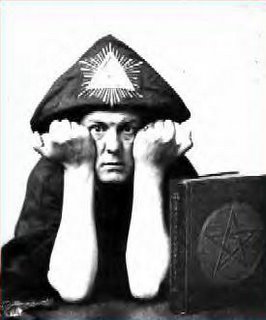
Welcome to "The Gods Are Bored!" Ask not what your god can do for you. Ask what you can do for your god! The bored gods need a good agent, some promotional material, and at least a public access cable channel.
This week we're looking at cults. If you're shopping for a new one, better be pretty clear how it stands on the matter of riding comets.
The fascinating dude pictured above is Aleister Crowley (1875-1947). It's rare to find an encyclopedia who does not list him individually, his religious groups Thelema, O.T.O., and The Hermetic Order of the Golden Dawn all as cults. (Individually Crowley is considered a cult leader.)
There's no doubt about it: This guy did some deep thinking, some psychic and psychological wonders, and some recruitment of followers who he encouraged to indulge in rites that might not seem so weird to horny Freemasons.
Certain bored gods appreciated him, especially Horus, the Egyptian deity we mentioned yesterday.
Crowley's teachings are complicated. However, they are readily available, because he wrote a great deal. Both Thelema and O.T.O. have survived him.
And therein lies the gray area. Neither of those organizations accords Crowley any deity status but rather uses his teachings as a way to achieve higher consciousness. He did not found the Golden Dawn. He learned from it and adapted its teachings to his own set of rites and rituals.
And, as any thinking person would, he rather enjoyed being called "The Wickedest Man Alive" by the popular press. Hey, it was a headline. Brought in followers.
Some of my legions of readers can actually penetrate Crowley's complicated celestial view. It eludes this druid because his most famous saying, "Do what thou wilt shall be the whole of the law," lacks the important subordinate clause of druidry -- "an thou harm none."
Recall, readers, that Anne's definition of cults includes the caveat that to be a cult, the group has to harm its members. There are recorded instances of this happening within Crowley's sphere. He turned some dude into a camel, for instance. And he was notorious for staining furniture.
Seriously, Crowley was a known manipulator who enjoyed the limelight. But the interesting concepts he introduced into Western occultism have outlived him and are therefore worth pondering. Right, Horus?
The point of this entry is, if you can separate the founder from the message, it's not necessarily a cult. This author would not recommend that anyone behave like Aleister Crowley, but if some enlightenment can be gained from his work, then rock on.
An afterthought: Crowley died nearly alone, penniless, and addicted to heroin shortly after WWII. There was no Tom Cruise or Donny Osmond in the picture to see to his bills. That's another key provision of our cult def. The leader has to be taken care of financially without lifting a finger. I believe there are times in the life of Crowley where that occurred, but not consistently.
But gosh is he photogenic for the purpose of these little essays!
FROM ANNE
ADMITTEDLY BAFFLED BY CROWLEY'S WORK
1 comment:
Hey, Dear Druid - nice post. You left out the second half of Crowley's motto: "Do as thou wilt shall be the whole of the law; Love is the Law, Love under will."
I've always felt that was very close to the Wiccan Rede. Uncle Al wasn't nearly as bad as people, himself included, like to make him out. He took some insane chances in ritual, but for the most part, I don't think he was any worse than Ben Franklin's Hellfire Club.
To me, the main element of a cult is mind control, combined with financial exploitation of its members for the benefit of the guru/messiah/prophet/leader, etc. I'm enjoying this series you're doing.
Post a Comment